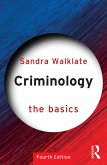Mark M. Lanier
Essential Criminology (eBook, PDF)
54,95 €
54,95 €
inkl. MwSt.
Sofort per Download lieferbar

27 °P sammeln
54,95 €
Als Download kaufen

54,95 €
inkl. MwSt.
Sofort per Download lieferbar

27 °P sammeln
Jetzt verschenken
Alle Infos zum eBook verschenken
54,95 €
inkl. MwSt.
Sofort per Download lieferbar
Alle Infos zum eBook verschenken

27 °P sammeln
Mark M. Lanier
Essential Criminology (eBook, PDF)
- Format: PDF
- Merkliste
- Auf die Merkliste
- Bewerten Bewerten
- Teilen
- Produkt teilen
- Produkterinnerung
- Produkterinnerung

Bitte loggen Sie sich zunächst in Ihr Kundenkonto ein oder registrieren Sie sich bei
bücher.de, um das eBook-Abo tolino select nutzen zu können.
Hier können Sie sich einloggen
Hier können Sie sich einloggen
Sie sind bereits eingeloggt. Klicken Sie auf 2. tolino select Abo, um fortzufahren.

Bitte loggen Sie sich zunächst in Ihr Kundenkonto ein oder registrieren Sie sich bei bücher.de, um das eBook-Abo tolino select nutzen zu können.
In this latest edition, the authors explore the kind of criminology that is needed for the globally interdependent twenty-first century. With cutting-edge updates, illustrative real-world examples, and new study tools for students, this text is a necessity for both undergraduate and graduate courses in criminology.
- Geräte: PC
- mit Kopierschutz
- eBook Hilfe
- Größe: 12.9MB
Andere Kunden interessierten sich auch für
![Essential Criminology (eBook, ePUB) Essential Criminology (eBook, ePUB)]() Mark M. LanierEssential Criminology (eBook, ePUB)54,95 €
Mark M. LanierEssential Criminology (eBook, ePUB)54,95 €![Criminology (eBook, PDF) Criminology (eBook, PDF)]() Sandra WalklateCriminology (eBook, PDF)18,95 €
Sandra WalklateCriminology (eBook, PDF)18,95 €![Deviance Today (eBook, PDF) Deviance Today (eBook, PDF)]() Addrain ConyersDeviance Today (eBook, PDF)45,95 €
Addrain ConyersDeviance Today (eBook, PDF)45,95 €![The Routledge Companion to Criminological Theory and Concepts (eBook, PDF) The Routledge Companion to Criminological Theory and Concepts (eBook, PDF)]() The Routledge Companion to Criminological Theory and Concepts (eBook, PDF)49,95 €
The Routledge Companion to Criminological Theory and Concepts (eBook, PDF)49,95 €![Literary Theory and Criminology (eBook, PDF) Literary Theory and Criminology (eBook, PDF)]() Rafe McgregorLiterary Theory and Criminology (eBook, PDF)40,95 €
Rafe McgregorLiterary Theory and Criminology (eBook, PDF)40,95 €![Control Theories of Crime and Delinquency (eBook, PDF) Control Theories of Crime and Delinquency (eBook, PDF)]() Control Theories of Crime and Delinquency (eBook, PDF)48,95 €
Control Theories of Crime and Delinquency (eBook, PDF)48,95 €![Justice, Crime, and Ethics (eBook, PDF) Justice, Crime, and Ethics (eBook, PDF)]() Michael C. BraswellJustice, Crime, and Ethics (eBook, PDF)75,95 €
Michael C. BraswellJustice, Crime, and Ethics (eBook, PDF)75,95 €-
-
-
In this latest edition, the authors explore the kind of criminology that is needed for the globally interdependent twenty-first century. With cutting-edge updates, illustrative real-world examples, and new study tools for students, this text is a necessity for both undergraduate and graduate courses in criminology.
Dieser Download kann aus rechtlichen Gründen nur mit Rechnungsadresse in A, B, BG, CY, CZ, D, DK, EW, E, FIN, F, GR, HR, H, IRL, I, LT, L, LR, M, NL, PL, P, R, S, SLO, SK ausgeliefert werden.
Produktdetails
- Produktdetails
- Verlag: Taylor & Francis eBooks
- Seitenzahl: 434
- Erscheinungstermin: 19. April 2018
- Englisch
- ISBN-13: 9780429962431
- Artikelnr.: 54217099
- Verlag: Taylor & Francis eBooks
- Seitenzahl: 434
- Erscheinungstermin: 19. April 2018
- Englisch
- ISBN-13: 9780429962431
- Artikelnr.: 54217099
- Herstellerkennzeichnung Die Herstellerinformationen sind derzeit nicht verfügbar.
Mark M Lanier
List of Tables and Figures Preface and Acknowledgments 1 What Is
Criminology? The Study of Crime, Criminals, and Victims in a Global Context
Globalization What is Criminology? What is Victimology? Summary and
Conclusion Discussion Questions 2 What is Crime? Defining the Problem Legal
Definition Consensus and Conflict Approaches Hagan's Pyramid of Crime Crime
Prism Application of the Prism to the Problem of School Violence Crimes of
the Powerless Crimes of the Powerful Summary and Conclusion Discussion
Questions 3 Classical, Neoclassical, and Rational Choice Theories The
Preclassical Era The Classical Reaction Neoclassical Revisions Criminal
Justice Implications: The Move to "Justice" Theory Redefining Rational
Choice: Situational Factors and Routine Activities Theory Conceptual and
Empirical Limitations: What the Research Shows Summary and Conclusion
Summary Chart: Classical, Rational Choice and Routine Activities Theories
Discussion Questions 4 "Born to Be Bad": Biological, Physiological and
Biosocial Theories of Crime Biological and Positivistic Assumptions The
Born Criminal Early U.S. Family-Type and Body-Type Theories Contemporary
Biological Perspectives Biosocial Criminology: A Developmental Explanation
of Crime Conceptual and Empirical Limitations Criminal Justice Policy
Implications Summary and Conclusion Summary Chart: Biological Theory
Discussion Questions 5 Criminal Minds: Psychiatric and Psychological
Explanations for Crime From Sick Minds to Abnormal Behavior Shared
Psychological Assumptions The Psychoanalytic Approach Trait-Based
Personality Theories Behavioral, Situational, and Social Learning and
Modeling Theories Cognitive Theories Ecological Psychology Evolutionary
Psychology Summary and Conclusion Summary Chart: Psychological Theories of
Crime Discussion Questions 6 Learning Criminal Behavior: Social Process
Theories Common Themes and Different Assumptions Sutherland's Differential
Association Theory Cognitive Social Learning Neutralization Theory:
Criminology? The Study of Crime, Criminals, and Victims in a Global Context
Globalization What is Criminology? What is Victimology? Summary and
Conclusion Discussion Questions 2 What is Crime? Defining the Problem Legal
Definition Consensus and Conflict Approaches Hagan's Pyramid of Crime Crime
Prism Application of the Prism to the Problem of School Violence Crimes of
the Powerless Crimes of the Powerful Summary and Conclusion Discussion
Questions 3 Classical, Neoclassical, and Rational Choice Theories The
Preclassical Era The Classical Reaction Neoclassical Revisions Criminal
Justice Implications: The Move to "Justice" Theory Redefining Rational
Choice: Situational Factors and Routine Activities Theory Conceptual and
Empirical Limitations: What the Research Shows Summary and Conclusion
Summary Chart: Classical, Rational Choice and Routine Activities Theories
Discussion Questions 4 "Born to Be Bad": Biological, Physiological and
Biosocial Theories of Crime Biological and Positivistic Assumptions The
Born Criminal Early U.S. Family-Type and Body-Type Theories Contemporary
Biological Perspectives Biosocial Criminology: A Developmental Explanation
of Crime Conceptual and Empirical Limitations Criminal Justice Policy
Implications Summary and Conclusion Summary Chart: Biological Theory
Discussion Questions 5 Criminal Minds: Psychiatric and Psychological
Explanations for Crime From Sick Minds to Abnormal Behavior Shared
Psychological Assumptions The Psychoanalytic Approach Trait-Based
Personality Theories Behavioral, Situational, and Social Learning and
Modeling Theories Cognitive Theories Ecological Psychology Evolutionary
Psychology Summary and Conclusion Summary Chart: Psychological Theories of
Crime Discussion Questions 6 Learning Criminal Behavior: Social Process
Theories Common Themes and Different Assumptions Sutherland's Differential
Association Theory Cognitive Social Learning Neutralization Theory:
List of Tables and Figures Preface and Acknowledgments 1 What Is Criminology? The Study of Crime, Criminals, and Victims in a Global Context Globalization What is Criminology? What is Victimology? Summary and Conclusion Discussion Questions 2 What is Crime? Defining the Problem Legal Definition Consensus and Conflict Approaches Hagan's Pyramid of Crime Crime Prism Application of the Prism to the Problem of School Violence Crimes of the Powerless Crimes of the Powerful Summary and Conclusion Discussion Questions 3 Classical, Neoclassical, and Rational Choice Theories The Preclassical Era The Classical Reaction Neoclassical Revisions Criminal Justice Implications: The Move to Justice Theory Redefining Rational Choice: Situational Factors and Routine Activities Theory Conceptual and Empirical Limitations: What the Research Shows Summary and Conclusion Summary Chart: Classical, Rational Choice and Routine Activities Theories Discussion Questions 4 Born to Be Bad: Biological, Physiological and Biosocial Theories of Crime Biological and Positivistic Assumptions The Born Criminal Early U.S. Family-Type and Body-Type Theories Contemporary Biological Perspectives Biosocial Criminology: A Developmental Explanation of Crime Conceptual and Empirical Limitations Criminal Justice Policy Implications Summary and Conclusion Summary Chart: Biological Theory Discussion Questions 5 Criminal Minds: Psychiatric and Psychological Explanations for Crime From Sick Minds to Abnormal Behavior Shared Psychological Assumptions The Psychoanalytic Approach Trait-Based Personality Theories Behavioral, Situational, and Social Learning and Modeling Theories Cognitive Theories Ecological Psychology Evolutionary Psychology Summary and Conclusion Summary Chart: Psychological Theories of Crime Discussion Questions 6 Learning Criminal Behavior: Social Process Theories Common Themes and Different Assumptions Sutherland's Differential Association Theory Cognitive Social Learning Neutralization Theory:
List of Tables and Figures Preface and Acknowledgments 1 What Is
Criminology? The Study of Crime, Criminals, and Victims in a Global Context
Globalization What is Criminology? What is Victimology? Summary and
Conclusion Discussion Questions 2 What is Crime? Defining the Problem Legal
Definition Consensus and Conflict Approaches Hagan's Pyramid of Crime Crime
Prism Application of the Prism to the Problem of School Violence Crimes of
the Powerless Crimes of the Powerful Summary and Conclusion Discussion
Questions 3 Classical, Neoclassical, and Rational Choice Theories The
Preclassical Era The Classical Reaction Neoclassical Revisions Criminal
Justice Implications: The Move to "Justice" Theory Redefining Rational
Choice: Situational Factors and Routine Activities Theory Conceptual and
Empirical Limitations: What the Research Shows Summary and Conclusion
Summary Chart: Classical, Rational Choice and Routine Activities Theories
Discussion Questions 4 "Born to Be Bad": Biological, Physiological and
Biosocial Theories of Crime Biological and Positivistic Assumptions The
Born Criminal Early U.S. Family-Type and Body-Type Theories Contemporary
Biological Perspectives Biosocial Criminology: A Developmental Explanation
of Crime Conceptual and Empirical Limitations Criminal Justice Policy
Implications Summary and Conclusion Summary Chart: Biological Theory
Discussion Questions 5 Criminal Minds: Psychiatric and Psychological
Explanations for Crime From Sick Minds to Abnormal Behavior Shared
Psychological Assumptions The Psychoanalytic Approach Trait-Based
Personality Theories Behavioral, Situational, and Social Learning and
Modeling Theories Cognitive Theories Ecological Psychology Evolutionary
Psychology Summary and Conclusion Summary Chart: Psychological Theories of
Crime Discussion Questions 6 Learning Criminal Behavior: Social Process
Theories Common Themes and Different Assumptions Sutherland's Differential
Association Theory Cognitive Social Learning Neutralization Theory:
Criminology? The Study of Crime, Criminals, and Victims in a Global Context
Globalization What is Criminology? What is Victimology? Summary and
Conclusion Discussion Questions 2 What is Crime? Defining the Problem Legal
Definition Consensus and Conflict Approaches Hagan's Pyramid of Crime Crime
Prism Application of the Prism to the Problem of School Violence Crimes of
the Powerless Crimes of the Powerful Summary and Conclusion Discussion
Questions 3 Classical, Neoclassical, and Rational Choice Theories The
Preclassical Era The Classical Reaction Neoclassical Revisions Criminal
Justice Implications: The Move to "Justice" Theory Redefining Rational
Choice: Situational Factors and Routine Activities Theory Conceptual and
Empirical Limitations: What the Research Shows Summary and Conclusion
Summary Chart: Classical, Rational Choice and Routine Activities Theories
Discussion Questions 4 "Born to Be Bad": Biological, Physiological and
Biosocial Theories of Crime Biological and Positivistic Assumptions The
Born Criminal Early U.S. Family-Type and Body-Type Theories Contemporary
Biological Perspectives Biosocial Criminology: A Developmental Explanation
of Crime Conceptual and Empirical Limitations Criminal Justice Policy
Implications Summary and Conclusion Summary Chart: Biological Theory
Discussion Questions 5 Criminal Minds: Psychiatric and Psychological
Explanations for Crime From Sick Minds to Abnormal Behavior Shared
Psychological Assumptions The Psychoanalytic Approach Trait-Based
Personality Theories Behavioral, Situational, and Social Learning and
Modeling Theories Cognitive Theories Ecological Psychology Evolutionary
Psychology Summary and Conclusion Summary Chart: Psychological Theories of
Crime Discussion Questions 6 Learning Criminal Behavior: Social Process
Theories Common Themes and Different Assumptions Sutherland's Differential
Association Theory Cognitive Social Learning Neutralization Theory:
List of Tables and Figures Preface and Acknowledgments 1 What Is Criminology? The Study of Crime, Criminals, and Victims in a Global Context Globalization What is Criminology? What is Victimology? Summary and Conclusion Discussion Questions 2 What is Crime? Defining the Problem Legal Definition Consensus and Conflict Approaches Hagan's Pyramid of Crime Crime Prism Application of the Prism to the Problem of School Violence Crimes of the Powerless Crimes of the Powerful Summary and Conclusion Discussion Questions 3 Classical, Neoclassical, and Rational Choice Theories The Preclassical Era The Classical Reaction Neoclassical Revisions Criminal Justice Implications: The Move to Justice Theory Redefining Rational Choice: Situational Factors and Routine Activities Theory Conceptual and Empirical Limitations: What the Research Shows Summary and Conclusion Summary Chart: Classical, Rational Choice and Routine Activities Theories Discussion Questions 4 Born to Be Bad: Biological, Physiological and Biosocial Theories of Crime Biological and Positivistic Assumptions The Born Criminal Early U.S. Family-Type and Body-Type Theories Contemporary Biological Perspectives Biosocial Criminology: A Developmental Explanation of Crime Conceptual and Empirical Limitations Criminal Justice Policy Implications Summary and Conclusion Summary Chart: Biological Theory Discussion Questions 5 Criminal Minds: Psychiatric and Psychological Explanations for Crime From Sick Minds to Abnormal Behavior Shared Psychological Assumptions The Psychoanalytic Approach Trait-Based Personality Theories Behavioral, Situational, and Social Learning and Modeling Theories Cognitive Theories Ecological Psychology Evolutionary Psychology Summary and Conclusion Summary Chart: Psychological Theories of Crime Discussion Questions 6 Learning Criminal Behavior: Social Process Theories Common Themes and Different Assumptions Sutherland's Differential Association Theory Cognitive Social Learning Neutralization Theory:







